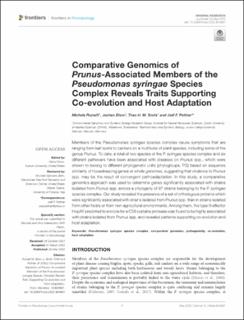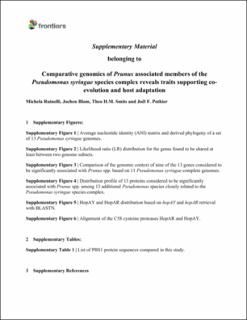Please use this identifier to cite or link to this item:
https://doi.org/10.21256/zhaw-24957Full metadata record
| DC Field | Value | Language |
|---|---|---|
| dc.contributor.author | Ruinelli, Michela | - |
| dc.contributor.author | Blom, Jochen | - |
| dc.contributor.author | Smits, Theo H. M. | - |
| dc.contributor.author | Pothier, Joël F. | - |
| dc.date.accessioned | 2022-05-12T11:25:53Z | - |
| dc.date.available | 2022-05-12T11:25:53Z | - |
| dc.date.issued | 2022-05-03 | - |
| dc.identifier.issn | 1664-302X | de_CH |
| dc.identifier.uri | https://digitalcollection.zhaw.ch/handle/11475/24957 | - |
| dc.description | Related publication: https://doi.org/10.1186/s12864-019-5555-y | de_CH |
| dc.description.abstract | Members of the Pseudomonas syringae species complex cause symptoms that are ranging from leaf spots to cankers on a multitude of plant species, including some of the genus Prunus. To date, a total of two species of the P. syringae species complex and six different pathovars have been associated with diseases on Prunus spp., which were shown to belong to different phylogenetic units (phylogroups, PG) based on sequence similarity of housekeeping genes or whole genomes, suggesting that virulence to Prunus spp. may be the result of convergent pathoadaptation. In this study, a comparative genomics approach was used to determine genes significantly associated with strains isolated from Prunus spp. across a phylogeny of 97 strains belonging to the P. syringae species complex. Our study revealed the presence of a set of orthologous proteins which were significantly associated with strains isolated from Prunus spp. than in strains isolated from other hosts or from non-agricultural environments. Among them, the type III effector HopAY predicted to encode for a C58 cysteine protease was found to be highly associated with strains isolated from Prunus spp. and revealed patterns supporting co-evolution and host adaptation. | de_CH |
| dc.language.iso | en | de_CH |
| dc.publisher | Frontiers Research Foundation | de_CH |
| dc.relation.ispartof | Frontiers in Microbiology | de_CH |
| dc.rights | http://creativecommons.org/licenses/by/4.0/ | de_CH |
| dc.subject | Pseudomonas syringae species complex | de_CH |
| dc.subject | Comparative genomics | de_CH |
| dc.subject | Pathogenicity | de_CH |
| dc.subject | Co-evolution | de_CH |
| dc.subject | Host adaptation | de_CH |
| dc.subject.ddc | 572: Biochemie | de_CH |
| dc.subject.ddc | 579: Mikrobiologie | de_CH |
| dc.title | Comparative genomics of Prunus-associated members of the Pseudomonas syringae species complex reveals traits supporting co-evolution and host adaptation | de_CH |
| dc.type | Beitrag in wissenschaftlicher Zeitschrift | de_CH |
| dcterms.type | Text | de_CH |
| zhaw.departement | Life Sciences und Facility Management | de_CH |
| zhaw.organisationalunit | Institut für Umwelt und Natürliche Ressourcen (IUNR) | de_CH |
| dc.identifier.doi | 10.3389/fmicb.2022.804681 | de_CH |
| dc.identifier.doi | 10.21256/zhaw-24957 | - |
| zhaw.funding.eu | info:eu-repo/grantAgreement/EC/FP7/613678//Strategies to develop effective, innovative and practical approaches to protect major European fruit crops from pests and pathogens/DROPSA | de_CH |
| zhaw.issue | 804681 | de_CH |
| zhaw.originated.zhaw | Yes | de_CH |
| zhaw.publication.status | publishedVersion | de_CH |
| zhaw.volume | 13 | de_CH |
| zhaw.publication.review | Open peer review | de_CH |
| zhaw.webfeed | Umweltgenomik | de_CH |
| zhaw.funding.zhaw | DROPSA – Strategies to develop effective, innovative and practical approaches to protect major European fruit crops from pests and pathogens | de_CH |
| zhaw.funding.zhaw | COST Action – Sustainable production of high quality cherries for the European market | de_CH |
| zhaw.author.additional | No | de_CH |
| zhaw.display.portrait | Yes | de_CH |
| zhaw.monitoring.costperiod | 2022 | de_CH |
| Appears in collections: | Publikationen Life Sciences und Facility Management | |
Files in This Item:
| File | Description | Size | Format | |
|---|---|---|---|---|
| 2022_Ruinelli-etal_Comparative-genomics-Prunus-associated-members.pdf | Article | 8.79 MB | Adobe PDF |  View/Open |
| 2022_Ruinelli-etal_Comparative-genomics-Prunus-associated-members_Suppl.pdf | Supplementary Material | 8.12 MB | Adobe PDF |  View/Open |
Show simple item record
Ruinelli, M., Blom, J., Smits, T. H. M., & Pothier, J. F. (2022). Comparative genomics of Prunus-associated members of the Pseudomonas syringae species complex reveals traits supporting co-evolution and host adaptation. Frontiers in Microbiology, 13(804681). https://doi.org/10.3389/fmicb.2022.804681
Ruinelli, M. et al. (2022) ‘Comparative genomics of Prunus-associated members of the Pseudomonas syringae species complex reveals traits supporting co-evolution and host adaptation’, Frontiers in Microbiology, 13(804681). Available at: https://doi.org/10.3389/fmicb.2022.804681.
M. Ruinelli, J. Blom, T. H. M. Smits, and J. F. Pothier, “Comparative genomics of Prunus-associated members of the Pseudomonas syringae species complex reveals traits supporting co-evolution and host adaptation,” Frontiers in Microbiology, vol. 13, no. 804681, May 2022, doi: 10.3389/fmicb.2022.804681.
RUINELLI, Michela, Jochen BLOM, Theo H. M. SMITS und Joël F. POTHIER, 2022. Comparative genomics of Prunus-associated members of the Pseudomonas syringae species complex reveals traits supporting co-evolution and host adaptation. Frontiers in Microbiology. 3 Mai 2022. Bd. 13, Nr. 804681. DOI 10.3389/fmicb.2022.804681
Ruinelli, Michela, Jochen Blom, Theo H. M. Smits, and Joël F. Pothier. 2022. “Comparative Genomics of Prunus-Associated Members of the Pseudomonas Syringae Species Complex Reveals Traits Supporting Co-Evolution and Host Adaptation.” Frontiers in Microbiology 13 (804681). https://doi.org/10.3389/fmicb.2022.804681.
Ruinelli, Michela, et al. “Comparative Genomics of Prunus-Associated Members of the Pseudomonas Syringae Species Complex Reveals Traits Supporting Co-Evolution and Host Adaptation.” Frontiers in Microbiology, vol. 13, no. 804681, May 2022, https://doi.org/10.3389/fmicb.2022.804681.
Items in DSpace are protected by copyright, with all rights reserved, unless otherwise indicated.